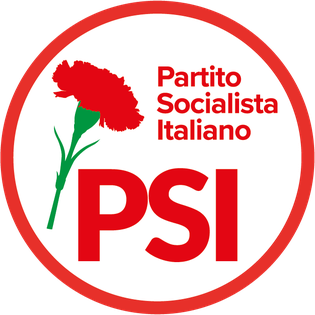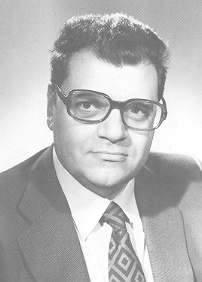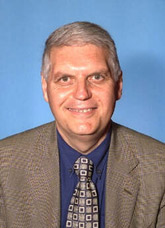
Benedetto "Bettino" Craxi was an Italian politician, leader of the Italian Socialist Party (PSI) from 1976 to 1993, and the 45th prime minister of Italy from 1983 to 1987. He was the first PSI member to become prime minister and the third from a socialist party to hold the office. He led the third-longest government in the Italian Republic and he is considered one of the most powerful and prominent politicians of the First Italian Republic.

The New Italian Socialist Party or New PSI, more recently styled as Liberal Socialists – NPSI, is a political party in Italy which professes a social-democratic ideology and claims to be the successor to the historical Italian Socialist Party, which was disbanded after the judiciary tempest of the early 1990s.

The Italian Socialist Party was a socialist and later social-democratic political party in Italy, whose history stretched for longer than a century, making it one of the longest-living parties of the country.

Vittorio Michele Craxi, commonly known as Bobo Craxi, is an Italian politician, son of the former Italian Prime Minister Bettino Craxi and brother of Stefania Craxi.

Fabrizio Cicchitto is an Italian politician, whose career has followed a trajectory from radical socialism to centre-right reformism.
Migliorismo, or meliorism, was a tendency within the Italian Communist Party. Its leader was Giorgio Napolitano, and it counted among its number Gerardo Chiaromonte and Emanuele Macaluso. It was also referred to as the "right wing" of the Italian Communist Party, due to the relatively moderate and reformist views of its adherents.

Antonio Giolitti was an Italian politician and cabinet member. He was the grandson of Giovanni Giolitti, the well-known liberal statesman of the pre-fascist period who served as Prime Minister of Italy five times.

The 1979 Italian general election was held in Italy on 3 June 1979. This election was called just a week before the European vote: the failure to hold the two elections at the same time caused much criticism for wasting public money.

The 1983 Italian general election was held in Italy on 26 June 1983. The Pentaparty formula, the governative alliance between five centrist parties, caused unexpected problems to Christian Democracy. The alliance was fixed and universal, extended both to the national government and to the local administrations. Considering that the election result did no longer depend on the strength of the DC, but the strength of the entire Pentapartito, centrist electors began to look at the Christian Democratic vote as not necessary to prevent a Communist success. Moreover, voting for one of the four minor parties of the alliance was seen as a form of moderate protest against the government without giving advantages to the PCI. Other minor effects of this election were a reduction of the referendarian Radical Party and the appearance of some regional forces.
The Socialist Party was a tiny social-democratic political party in Italy.

The Italian Socialist Party is a social-democratic political party in Italy. The party was founded in 2007–2008 by the merger of the following social-democratic parties and groups: Enrico Boselli's Italian Democratic Socialists, the faction of the New Italian Socialist Party led by Gianni De Michelis, The Italian Socialists of Bobo Craxi, Democracy and Socialism of Gavino Angius, the Association for the Rose in the Fist of Lanfranco Turci, Socialism is Freedom of Rino Formica and some other minor organizations. Until October 2009, the party was known as Socialist Party.

Pietro Longo (born 29 October 1935) is an Italian politician.

The Legislature IX of Italy was the 9th legislature of the Italian Republic, and lasted from 12 July 1983 until 1 July 1987. Its composition was the one resulting from the general election of 26 and 27 June 1983. The election was called by President Sandro Pertini one year before the previous legislature's natural end on 5 May 1983, after a crisis in the incumbent government majority (Pentapartito).

Valerio Zanone was an Italian politician, who was formerly secretary and president of the Italian Liberal Party. He was also a senator for the Democratic Party, and was mayor of Turin from 1990 to 1992.

Salvatore Formica, best known as Rino Formica, is a former Italian politician.

Cornelio "Elio" Veltri is an Italian journalist and politician. He has been an author of several books and reports about illegality in the Italian economical and political world.
The Pentapartito, commonly shortened to CAF, refers to the coalition government of five Italian political parties that formed between June 1981 and April 1991. The coalition comprised the Christian Democracy (DC), the Italian Socialist Party (PSI), Italian Democratic Socialist Party (PSDI), Italian Liberal Party (PLI) and Italian Republican Party (PRI).
The Organic centre-left was a coalition of four Italian political parties that formed governments throughout the 1960s and the middle 1970s. The word "organic" meant that the Italian Socialist Party was fully part of the government, it was within the "organization" of the cabinet, differently from other centre-left governments in the early 1960s, where the PSI gave an external support only.

Claudio Signorile is an Italian politician.
Socialism in Italy is a political movement that developed during the Industrial Revolution over a course of 120 years, which came to a head during the Revolutions of 1848. At the beginning of the 20th century, there were a growing number of social changes. The outbreak of the First World War accelerated economic differentiation causing a wider wealth gap. This is seen as one of the key factors that triggered the emergence of Italian socialism.















